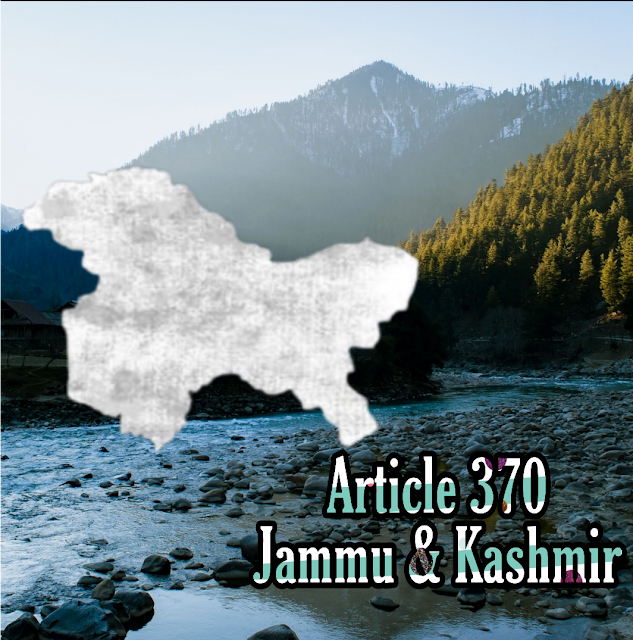There has been a lot of discussion about Article 370 of the Indian Constitution in this time general elections and BJP leaders have been against the statements of Kashmiri leaders about this. Now after the statement of Dr. Jeetendrasingh, Minister of State for Independent Charge in the newly appointed Science and Technology, PMO, the case of Section 370 has come into controversy again as a special effort for Jammu and Kashmir.
The minister said that a consensus has been reached to remove Section 370 from Jammu and Kashmir. While Farooq Abdullah has said that even if Modi becomes the Prime Minister of India ten times, Article 370 cannot be removed. State Chief Minister Omar Abdullah says that either 370 will remain or Jammu Kashmir will not be a part of India. Therefore, it is important that we know what Article 370 is and what privileges are given to Jammu and Kashmir under it.
Jammu and Kashmir was not included in the Republic of India at the time of independence, but there were options before it to join either India or Pakistan. At that time, the Muslim majority population of Kashmir wanted to meet Pakistan but the last Maharaja of the state, Harisingh, had an inclination towards India. Harisingh signed a document called "Instrument of Accession" with India. Subsequently, Jammu and Kashmir was given the status of a special state under Article 370 of the Indian Constitution. The then Prime Minister Jawaharlal Nehru made Sheikh Abdullah the Prime Minister of Jammu and Kashmir. Instead of the Chief Minister, instead of the Prime Minister and the Governor, there was a Sadar-e-Riyasat. It is noteworthy that for this reason, Kashmir also has its own separate flag and insignia.
Indian law is not effective
Under Article 370 of the Constitution, the rules of the Government of India do not apply in Kashmir like other states of the country. In the case of this state, the central government can only interfere in matters of defense, foreign policy, finance and communication. Also, the Union Government cannot legislate on subjects falling under the Union and Concurrent List. Citizenship, right to possess property and all fundamental rights are in the state's authority.
People from other states of India cannot buy land in Jammu and Kashmir. Section 360 imposing financial emergency is also not applicable. Here is a separate flag. President's rule may not apply.
In these cases, Parliament has to get the approval of the state to make laws. Due to property laws, no citizen of India can buy any property in Jammu and Kashmir. The citizens here have dual citizenship, that is, they are citizens of India on one side and the state of Jammu and Kashmir. People from other states of India cannot get jobs in this state.
Be aware that the Constitution of Jammu and Kashmir is also different from India. At the time of independence, a Constituent Assembly of the state made the constitution of Jammu and Kashmir. On November 17, 1952, the President of India ordered Article 370 to come into force in the state only after the approval of the Constituent Assembly of the state under the rights conferred in Article 370 (A) of the Constitution.
- Parliament of India cannot make any law other than defense, foreign affairs and communication.
- Section 356 not applicable, the President does not have the authority to dismiss the constitution of the state.
- If a Kashmiri girl marries an outsider, she would have lost her citizenship of Kashmir.
No Emergency in the State:According to the provisions of Section 370, no economic or other emergency can be imposed in the state. The central government cannot impose an economic emergency on the state. Emergency can be imposed in the state only in case of war and external aggression. Even if there are any internal disturbances in the state, the central government cannot impose an emergency in Jammu and Kashmir. But from time to time, changes have also been made in Section 370 and till 1965, there was no Chief Minister and Governor and in place of Sadar-e-Riyasat (Governor) and Prime Minister, but later on there was also Governor and Chief Minister. felt.
For this reason, when a citizen of India went to Jammu and Kashmir, he had to keep his identity card with him. This law of the state was strongly opposed and the situation was withdrawn after much opposition. The effectiveness of Article 370 was opposed from time to time and it has been said that this has increased the trend of secession among Kashmiris and Sangh and BJP leaders say that this situation is the biggest obstacle in the development of the state. Terrorism has flourished due to the isolation among Kashmiris and the inclination towards Pakistan in some sections of society and Hindus from the state and Kashmiri Pandits from the Kashmir Valley have been driven out.







No comments:
Post a Comment